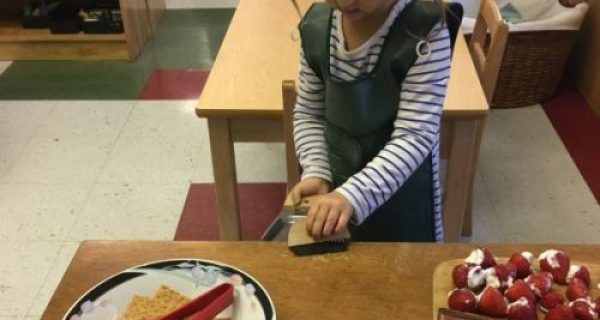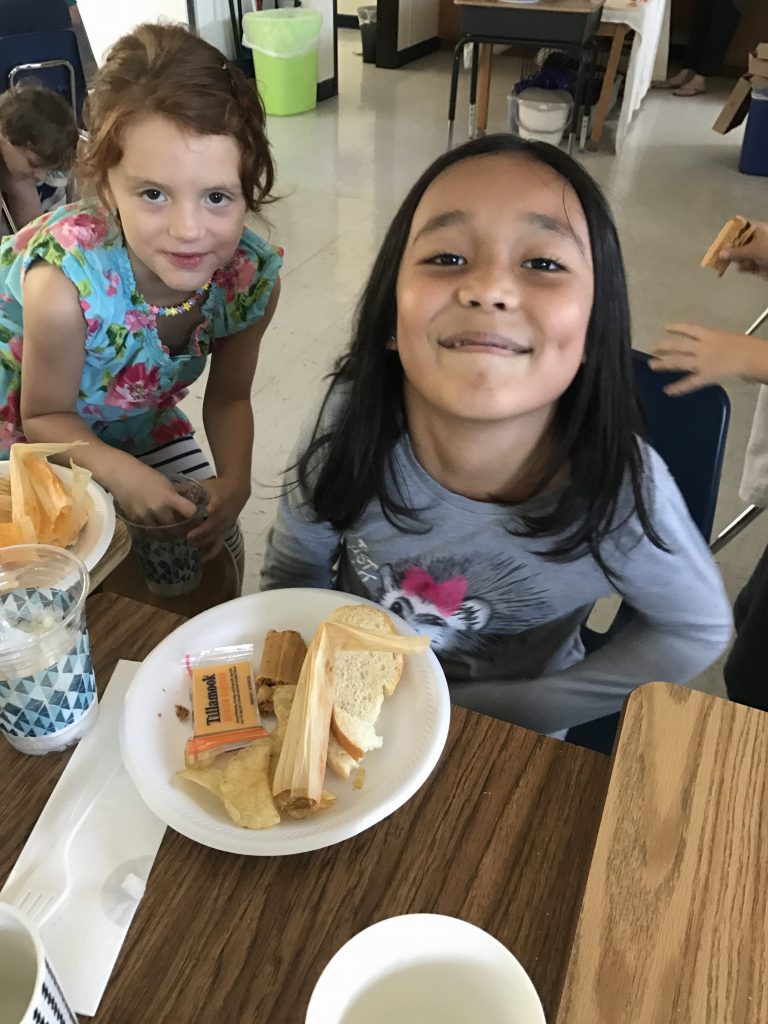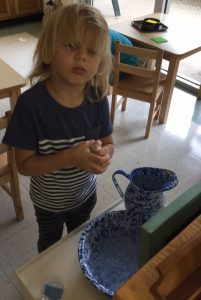It is such a sweet sound to hear “Thank you, Gwandma” from my two year old granddaughter, especially when it is without any prompting. We have gently reminded her to add a ‘thank you’ and modeled this act of gratitude so many times that now it is almost a reflex reaction. I am pleased when she remembers to thank her five year old sister and proud when she thanks the “lady” in the grocery store.
Expressing gratitude or thanks is one of the lessons covered in the Practical Life area of grace and courtesy. Many parents are surprised that grace and courtesy or social convention should be part of the curriculum. The name itself conjures up a wonderful quaint and old fashioned-idea, maybe little girls in frilly petticoats sipping tea, that little finger delicately cocked and little boys with starched shirts and greased down hair. However grace and courtesy is far from old-fashioned and it’s much more than surface-level manners.
Learning how to work and play together with others in a peaceful and caring community is perhaps the most critical skill that Montessori teaches. Short lessons, taking 15 seconds to a few minutes, are given to the children in areas that will help them learn directly the skills needed to get along with others. These range from nose blowing and other aspects of personal hygiene and care, to things like opening and closing doors quietly, not disturbing another’s work, table manners, and how to offer an apology.
Montessori showed that it could not be assumed that the child’s understanding of social rules and moral behavior will somehow be absorbed from somewhere and therefore it makes sense to teach them in short clear lessons. Children do not automatically know how to be respectful or how to be a good friend; these are demonstrated through role playing and modeled by teachers and older students. Such lessons are the foundation of the classroom and set the tone of respect and kindness.
How and when do we go about teaching these necessary lessons? Here are some skills listed by age.
Toddler
Eating habits
Using fork and spoon correctly
Chewing food with mouth closed
Asking to be excused from a meal
Sitting quietly in the chair during a meal
Toilet training
How and when to go the bathroom
Proper hygiene
How to wash hands
How to blow nose
Primary
Social Skills
How to greet people, using titles of respect when indicated
How to shake hands when greeting someone
Manners
How to excuse oneself when walking in front of someone
How to interrupt when necessary
How to say ‘please” and “thank you”
Care of the environment
How to water a plant
How to clean up a spill
How to open and shut a door quietly
How to pick up and carry a chair
Elementary
Social Skills
How to work with another person
How to resolve conflict
How to mediate between friends
How to help a younger child
Manners
Writing a thank you note
Speaking politely to friends, family and teachers
Being kind to others (treating them the way you want to be treated)
Environment
How to care for plants and animals
Setting a table for a meal
How to clean and straighten a classroom or room at home
How to serve in the community
Recycling and other ways to care for the earth
First impressions are lasting impressions and so it is important that children understand the rules of social engagement. Manner are not just about cute behavior; they show our empathy and respect for other people and are important life skills which determine how we are perceived in every area of our life, and ultimately our success.
Being mannerly makes you a better person, more relaxed and confident, less nervous and insecure. Not only will you like yourself, others will like you too. It’s easy to like someone who’s an all round nice person. Treating others with respect shows you respect yourself. Everyone benefits.
Children’s books about Manners
Primary
365 Manners Kids Should Know by Sheryl Eberly
Emily’s Everyday Manners by Peggy Post
Excuse me! by Karen Katz
Elementary
Dude that’s Rude!: (Get some manners) by Pamela Espeland and Elizabeth Verdick



